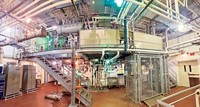Advertisement
Grab your lab coat. Let's get started
Welcome!
Welcome!
Create an account below to get 6 C&EN articles per month, receive newsletters and more - all free.
It seems this is your first time logging in online. Please enter the following information to continue.
As an ACS member you automatically get access to this site. All we need is few more details to create your reading experience.
Not you? Sign in with a different account.
Not you? Sign in with a different account.
ERROR 1
ERROR 1
ERROR 2
ERROR 2
ERROR 2
ERROR 2
ERROR 2
Password and Confirm password must match.
If you have an ACS member number, please enter it here so we can link this account to your membership. (optional)
ERROR 2
ACS values your privacy. By submitting your information, you are gaining access to C&EN and subscribing to our weekly newsletter. We use the information you provide to make your reading experience better, and we will never sell your data to third party members.
Business
Renewed Optimism for Fine Chemicals
Asian competition is rising, but a healthier pipeline has custom manufacturers feeling upbeat at CPhI
by Ann M. Thayer
October 23, 2006
| A version of this story appeared in
Volume 84, Issue 43

"In the past several years, the pharmaceutical fine chemicals industry has gone from amazing optimism through a complete crash," observed Guy Villax, chief executive officer of Hovione. "And now we are into a new phase."
The number of players has declined, assets have changed hands, and Asian competition has emerged. But outsourcing by pharmaceutical and biotechnology companies is on the rise, and custom fine chemicals manufacturers are again investing in their businesses. Portugal-based Hovione has about 40 projects under way for drugs in Phases I through III, a pipeline offering Villax some comfort that his facilities will be "properly populated" with commercial products in the years ahead.
Executives at other fine chemicals firms shared similar upbeat sentiments at the CPhI pharmaceutical ingredients conference in Paris earlier this month. The past year has been a good one, said Mark Cassidy, business director for small molecules at Dowpharma. His area has seen double-digit growth, supported by new product launches throughout the year. "We'll continue to benefit from new launches in 2007," he added, "although there's always volatility in how many will take off."
Besides lamenting the inherent risk in making active ingredients for drugs that may not be approved, some managers question whether recent positive developments will persist. Rudolf Hanko, vice president of Degussa's exclusive synthesis unit, maintained that the turnaround is not yet complete. "I don't exclude the possibility that this is just a time of stabilization," he said, noting that a true recovery will depend on pharmaceutical companies getting serious about shutting capacity, rather than selling assets to other companies.
Trade Groups Still Seek More Regulatory Oversight
The battle for a level regulatory playing field hasn't advanced much in the past year, so those looking to even the score globally have joined forces.
The European Fine Chemicals Group (EFCG) and the Synthetic Organic Chemical Manufacturers Association (SOCMA), two trade groups together representing about 500 fine chemicals producers, have published a joint position paper urging U.S. and European regulators to increase their inspections of foreign facilities that manufacture active pharmaceutical ingredients (APIs). This latest move follows SOCMA's January submission of a citizen petition to the U.S. Food & Drug Administration requesting more inspections of non-U.S. facilities. FDA hasn't yet responded, SOCMA President Joseph G. Acker said at the CPhI exposition in Paris earlier this month.
Nearly 80% of APIs used in the U.S. and Europe are made in foreign facilities, notably India and China, but most of these sites are not likely to be inspected to determine if they meet Good Manufacturing Practices (GMP) standards, SOCMA and EFCG said. Regulators spend most of their time looking at domestic facilities and haven't kept up with the "Asianization of API production," Acker said. Although FDA has an active foreign inspection service, its inspections are not proportionate to supply sources; in 2005, inspections in China and India accounted for just 23% of the total, according to FDA data.
European regulators have shown "zero willingness or interest in inspections," remarked Guy Villax, chief executive officer of the Portuguese fine chemicals maker Hovione and chairman of EFCG's pharmaceuticals business committee, and have neither budgeted for nor created a foreign inspection service. This situation persists despite a year-old law requiring that APIs in European drugs meet GMP standards (C&EN, Feb. 13, page 29). The responsibility still falls solely on drug company quality control staff to ensure that any APIs they use are made in compliance.
Meanwhile, U.S. regulators expend much more effort on inspecting API facilities prior to granting new drug approvals, and less on ingredients for over-the-counter or generic drugs, Acker pointed out. Although many top-tier companies in India are inspected and meet GMP standards (C&EN, Sept. 25, page 66), the trade groups believe an overall lack of enforcement can contribute to unsafe medicines and gives an unfair competitive advantage to those companies that avoid the burden of meeting standards because there aren't any deterrents for not complying.
Still, for smaller fine chemicals players, the capacity rationalization at big drug companies has coupled with fuller R&D pipelines at biotechnology firms to yield strong business improvements. Several custom chemical companies are now operating at full capacity and are even in a position to turn down work, commented Jans Ramakers, director of Jans Ramakers Fine Chemical Consulting Group in East Linton, Scotland. He pointed out, however, that much of the demand is for kilogram-to-pilot-scale projects, rather than commercial drug launches.
Halocarbon, River Edge, N.J., has been running its two-year-old plant in North Augusta, S.C., nearly flat-out to meet demand for several key fluorinated intermediates and for development work, said Technical Director Barry Jones. The company has been adding distillation capacity to increase output at its continuous process facility for fluorochemical products, many of which are going into approved pharmaceuticals.
To expand its reach in increasingly important international markets, Halocarbon has added five distributors in China, Japan, and Europe, said Ron Epstein, sales and marketing director. About half the company's business is international, he added.
The Italian firm FIS saw a significant upswing in business this year, largely the result of advances in development work under way during recent down years, according to Steven DeSalvo, U.S. sales manager. FIS, along with Ampac Fine Chemicals (AFC) and PPG Fine Chemicals, also pointed out the positive effect on business from contracts that Roche awarded earlier this year for materials it uses to make its antiviral drug Tamiflu (C&EN, March 20, page 10).
FIS has spent the past several years adding technologies such as high-pressure hydrogenation and low-temperature processing to its traditional base of benzodiazepine chemistry. Its goal is to offer a range of processes covering the drug development life cycle from lab scale to commercial production. The strategy has led to a significant increase in FIS's contract manufacturing business. FIS expects overall revenues of $150 million this year, up sharply from $81 million in 2005, and hopes to expand contract manufacturing to 70% of sales, said Roger Laforce, general manager.
In the face of low-cost Asian producers, many European and U.S. custom manufacturers have focused on technology development to gain a competitive edge. "AFC's strategy is based on chemistry and engineering, and it has worked well," said President Aslam Malik. Sales for the first nine months of AFC's fiscal year, which ends in September, were up 72% to a record $68.2 million. Customer inquiries have jumped, he said, especially for projects in the early-development stage.
AFC's emphasis remains its expertise in energetic and high-containment chemistries and in separations. Since February, its new simulated-moving-bed chromatography system has run almost continuously to separate hundreds of metric tons of racemic mixtures, Malik said. The system, which uses five 1,000-mm columns, is the largest operated by a custom manufacturer, he claims.
Several companies have expanded in the peptide chemistry niche. Roche Colorado, known for its synthesis of the anti-HIV peptide drug Fuzeon, is offering contract manufacturing to external customers. NeoMPS, the peptide manufacturing unit of SNPE, is investing $6 million to expand capacity in Strasbourg, France.
SNPE's Isochem custom chemical unit, meanwhile, will meet its sales target this year for the first time since the market began to decline in 2000, according to Thierry Malfroot, Isochem general manager. "It is still a very difficult business, but the last two years have been reasonably good, especially 2006," Malfroot said.
The company is restructuring with an eye to making R&D more responsive; it laid off 97 workers at its Toulouse, France, plant last year and an additional 59 research, plant, and headquarters staff this year. It is investing $3.7 million in new kilogram-scale manufacturing and is decentralizing its research operations. "We are working on simplifying our organization," Malfroot commented.
DSM, one of the larger and more established fine chemicals players, has benefited from consolidating its operations over the past few years, said Herman J. Wories, vice president for sales and marketing. The company recently sold its South Haven, Mich., operations to Albemarle and earlier closed its Greenville, S.C., facility.
"Our new initiative is to move up the value chain," Wories said. "We are going to concentrate on [FDA-]registered materials, where there are more opportunities for Western producers." There is still excess capacity in Europe and North America and, as shown by recent plant acquisitions by Indian firms, still room to make deals as diversified firms exit the market. "One thing is clear," he added, "there are still too many assets around."
Taking a different approach to dealing with competition from Asia, Pfizer CentreSource has signed up two Asian manufacturing partners for its steroids business. Shanghai-based Shanghai Pharmaceutical and Taiwan's ScinoPharm have agreed to take on the later stages of production for a range of Pfizer's steroid products.
Manufacturing of 18 steroid products will be shifted to Asia in three phases. The first phase, now under way, involves transferring commoditized steroid products. The company expects to see the first products out of the joint effort hit the market by the end of 2007.
The traditional small-molecule market is extremely competitive, said Denis Geffroy, European business manager at Almac Sciences, "and there isn't really enough work to survive." In response, the company is advancing its ambition to create a business in peptide and cytotoxic conjugation by investing about $1 million in pharmaceutical-grade peptide production at its Craigavon, Northern Ireland, and Edinburgh, Scotland, sites.
Using new synthesis and production technologies, Almac can make peptides of up to 170 amino acids long in quantities sufficient for clinical trials, Geffroy said. Almac's overall business has picked up over the past two years, Geffroy said, and the company is operating at full capacity with an expected 20% increase in annual sales this year.
For the fiscal year ending in May, Excelsyn's sales grew 51%, to $22 million, largely from its engineering business, and it turned a profit, according to CEO Ian Schott. Excelsyn is among several new names to appear on the fine chemicals scene, having been formed through a combination of acquired assets.
Today, Excelsyn has more than 50 projects under way, Schott said. To increase service levels, the company is converting its labs to full-time, 24/7 operation. Excelsyn's manufacturing and pilot-plant operations have been working at this rate since mid-September, he noted.
Expanding on its expertise in making nonnatural amino acids, Excelsyn's molecular development business unit announced an improved transaminase technology to produce tert-L-leucine, which is used in the synthesis of several major new drug candidates. The biocatalyst technology was acquired with the purchase of Great Lakes Chemical's fine chemicals business in 2004 and further developed through collaboration with the University of Wales, Bangor, and Ingenza, in Scotland.
Having already extended its asset base through high-profile acquisitions, NPIL Pharmaceuticals is now working on expanding its technology base. The Indian company has created an innovations unit, NPIL(i), to develop biocatalysis, chemocatalysis, and flow processing technology platforms and apply them for more cost-effective product development. Included in the NPIL(i) portfolio is the recently launched catalyst-based resolution process called SCRAM for producing chiral amines and alcohols.
Following its purchase of Avecia's custom synthesis business in late 2005, NPIL acquired a British active pharmaceutical ingredient (API) facility from Pfizer and signed a five-year, $350 million supply agreement with the drug firm. NPIL now has five sites in India, four in Europe, and one in North America. NPIL Pharma's annual sales are now about $200 million, reported Michael Fernandes, executive director for custom manufacturing. He envisions further expansion of the business in 2007.
Meanwhile, Archimica, the former Clariant pharmaceutical fine chemicals business, has emerged as an independent $250 million-per-year company. Along with new technology offerings for chiral epoxides, heterocyclic boronic acids, and titanium tetrachloride chemistry, as well as plant expansions in the U.S. and Europe, the company has added several generic APIs to its product portfolio. The decision to launch a new generic API requires a good technology fit plus cost-competitiveness with other global suppliers, company executives explained.
Codexis also announced it will begin direct sales of pharmaceutical intermediates for generic drugs. CEO Alan Shaw said the company's biocatalysis technology lowers production costs "by at least half," providing a significant competitive edge in generics, where cost of goods can represent as much as 50% of the overall value of a drug.
The first product to be launched is a key intermediate for atorvastatin, the active ingredient in Lipitor, Pfizer's cholesterol-lowering drug. Codexis said it has received initial orders for the intermediate, which will be manufactured by Arch Pharmalabs in India. Codexis will supply it first in countries where the drug is off patent, but Shaw has "high expectations of being one of the primary suppliers of atorvastatin by 2010," when Lipitor goes off patent in the U.S.
Officially taking on its new corporate identity just six months ago, Saltigo, the custom manufacturing unit of Lanxess, is also undergoing change and now sees a need to offer a broader range of services. Recognized for its large-scale production strengths, the firm has been looking toward developing its early-stage synthesis offerings and has been hiring process development chemists, said Wilhelm Stahl, head of Saltigo's pharma business.
Stahl said it is not surprising that even the more established contract firms are making strategic adjustments as business picks up. "Industry players were not born into custom manufacturing," he explained. "It took a lot of adaptation. I think we have another interesting five years ahead of us."





Join the conversation
Contact the reporter
Submit a Letter to the Editor for publication
Engage with us on Twitter